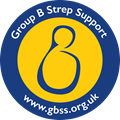Story
After a wonderful home birth (honestly!), Albie was admitted to hospital at less than a day old the following day. The visiting midwife was very calm when she mentioned his breathing was quick, probably not wanting to panic us she said it was probably nothing but needed to be checked right away. William and I thought it would be just a routine trip, after entering the A&E ward in moments there were different teams of about 20 people surrounding us, including resuscitation, asking all sorts of questions about my family health history, and pregnancy and birth - all of which had been absolutely text book plain sailing. Then Albie was whisked away in a little see-through box, we were shocked and frightened - very confused to what was happening for an agonising 5 hour wait until we could see him. One of the consultants said to us later when he was out of the woods, that when Albie arrived in A&E they knew they had a sick baby on their hands but by the time he went up to NICU he was critically ill - so the time we had to wait to see him was Albie fighting for his tiny life.
I count my lucky stars all the time that he won the fight (thanks to our incredible NHS), which was against a Group B Strep infection (GBS is one of the many bacteria that normally live in our bodies and which usually cause no harm) - something we had never heard of before it blasted into our lives very unexpectedly. It's utterly heartbreaking that many babies are not so lucky and die or end up with a long term disability because of a GBS infection.
Albie has turned 5 this year and I wanted to mark the milestone with raising awareness and money for the Group B Streptococcus charity who amongst it's work support families who have been affected by GBS and who is campaigning for all expectant mothers in the UK to be informed about GBS as a routine part of antenatal care and wants all women in the UK to be offered a GBS test as part of a national screening programme. Administering antibiotics during birth prevents most cases of infection (something I had with my second child Finn). GBS infections in England are currently more than double that of many other high-income countries, many who have introduced routine antenatal screening for GBS.
Group B Streptococcus is the UK's most common cause of life-threatening infection in newborn babies and of meningitis in babies under age 3 months.
On average in the UK, at least
-two babies a day develop a group B Strep infection
-one baby a week dies from their GBS infection, and
-one baby a week survives with long-term disabilities – physical, mental or both.
Yet most group B Strep infections are preventable. Group B Strep Support informs families & health professionals about group B Strep to save tiny lives.
